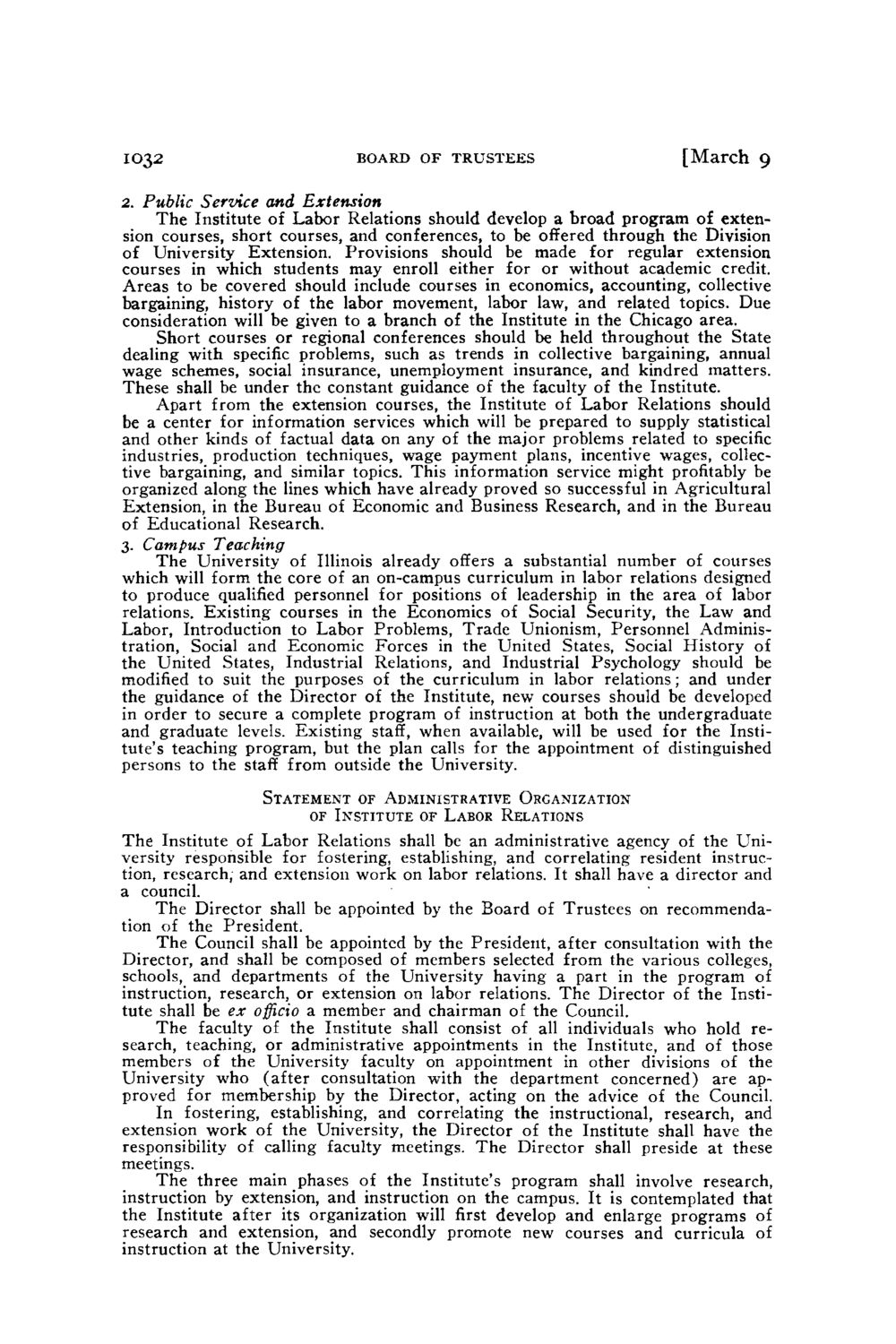| |
| |
Caption: Board of Trustees Minutes - 1946
This is a reduced-resolution page image for fast online browsing.

EXTRACTED TEXT FROM PAGE:
1032 BOARD OF TRUSTEES [March 9 2. Public Service and Extension T h e Institute of Labor Relations should develop a broad program of extension courses, short courses, and conferences, to be offered through the Division of University Extension. Provisions should be made for regular extension courses in which students may enroll either for or without academic credit. Areas to be covered should include courses in economics, accounting, collective bargaining, history of the labor movement, labor law, and related topics. Due consideration will be given to a branch of the Institute in the Chicago area. Short courses or regional conferences should be held throughout the State dealing with specific problems, such as trends in collective bargaining, annual wage schemes, social insurance, unemployment insurance, and kindred matters. These shall be under the constant guidance of the faculty of the Institute. Apart from the extension courses, the Institute of Labor Relations should be a center for information services which will be prepared to supply statistical and other kinds of factual data on any of the major problems related to specific industries, production techniques, wage payment plans, incentive wages, collective bargaining, and similar topics. This information service might profitably be organized along the lines which have already proved so successful in Agricultural Extension, in the Bureau of Economic and Business Research, and in the Bureau of Educational Research. 3. Campus Teaching The University of Illinois already offers a substantial number of courses which will form the core of an on-campus curriculum in labor relations designed to produce qualified personnel for positions of leadership in the area of labor relations. Existing courses in the Economics of Social Security, the Law and Labor, Introduction to Labor Problems, T r a d e Unionism, Personnel Administration, Social and Economic Forces in the United States, Social History of the United States, Industrial Relations, and Industrial Psychology should be modified to suit the purposes of the curriculum in labor relations; and under the guidance of the Director of the Institute, new courses should be developed in order to secure a complete program of instruction at both the undergraduate and graduate levels. Existing staff, when available, will be used for the Institute's teaching program, but the plan calls for the appointment of distinguished persons to the staff from outside the University. STATEMENT OF ADMINISTRATIVE ORGANIZATION OF INSTITUTE OF LABOR RELATIONS The Institute of Labor Relations shall be an administrative agency of the University responsible for fostering, establishing, and correlating resident instruction, research, and extension work on labor relations. It shall have a director and a council. The Director shall be appointed by the Board of Trustees on recommendation of the President. The Council shall be appointed by the President, after consultation with the Director, and shall be composed of members selected from the various colleges, schools, and departments of the University having a part in the program of instruction, research, or extension on labor relations. The Director of the Institute shall be ex officio a member and chairman of the Council. T h e faculty of the Institute shall consist of all individuals who hold research, teaching, or administrative appointments in the Institute, and of those members of the University faculty on appointment in other divisions of the University who (after consultation with the department concerned) are approved for membership by the Director, acting on the advice of the Council. In fostering, establishing, and correlating the instructional, research, and extension work of the University, the Director of the Institute shall have the responsibility of calling faculty meetings. T h e Director shall preside at these meetings. T h e three main phases of the Institute's program shall involve research, instruction by extension, and instruction on the campus. It is contemplated that the Institute after its organization will first develop and enlarge programs of research and extension, and secondly promote new courses and curricula of instruction at the University.
| |